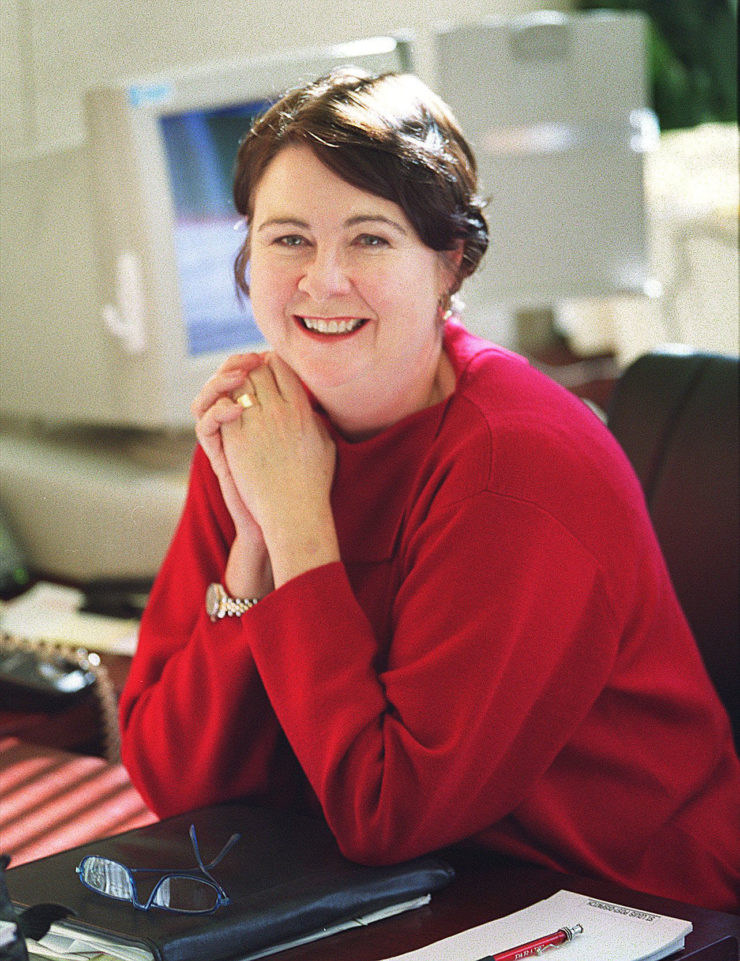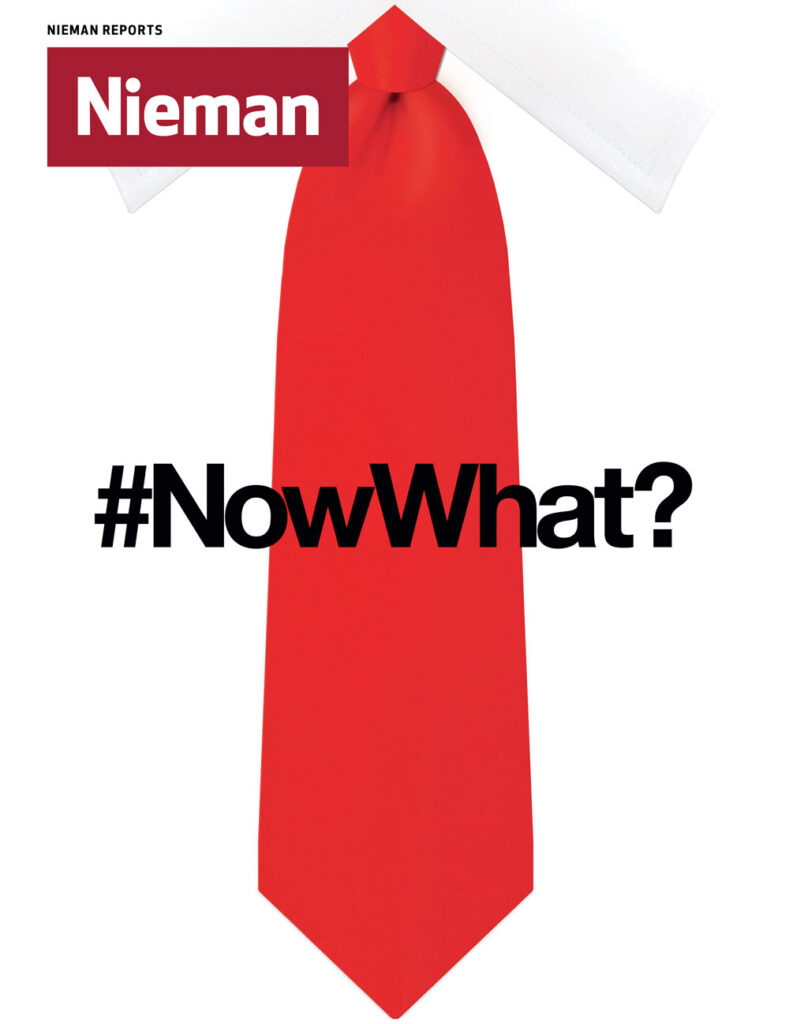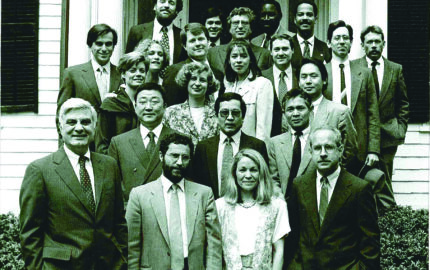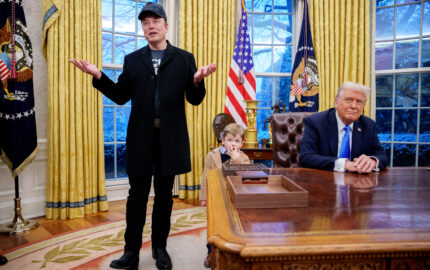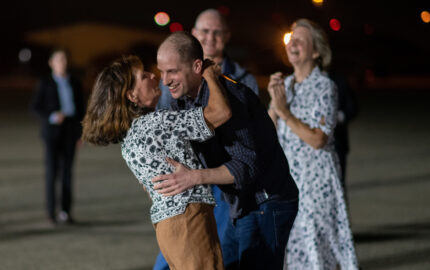Iwas a kid, really—24 or 25—walking up Chicago’s Michigan Avenue on my way to the bus when a man twice my age blocked my path. He was dressed in the uniform of the business elite and held out identification from one of the city’s leading cultural institutions, as if that could excuse what he was about to say.
He leaned in close so that I would hear his coarse proposition above the evening rush hour. “Five hundred dollars for a half hour,” he said. “I’m a very wealthy man.”
Over the years, there would be other, more personal affronts of the sort familiar to many women in newsrooms—the handsy city editor; a source’s solicitations mid-interview; a feature editor’s unbidden shoulder massages. Looking back, I see that anticipating and deflecting predator colleagues was simply a skill woman journalists of my generation acquired in stride, like how to write a lede or decode property records. But on my walk to the bus that evening—worn from the work day, weighed down with newspapers and notebooks—the stranger taught me the limits of my imagination. Depravity lurked around unseen corners, the power to sting without ever touching you.
The reason it is so easy for women to believe the avalanche of accusations about harassment and sexual abuse is that most of us are members of a reluctant sorority. We don’t need to have suffered the worst to have seen that men can abuse with impunity. And it is not coincidental that our industry—where harassers recently have been toppled at National Public Radio, CBS, Fox, NBC, The New Republic, and elsewhere—employs so few women in the most senior roles. The fix is not sexual harassment training, but more people in leadership who already know better.
I once watched an editor canvass the Chicago Tribune newsroom looking for reporters to staff an upcoming story. An experienced reporter, who happened to be pregnant, volunteered. “Forget it!” he bellowed. “You’ll be in the stirrups by then.” And just like that, in front of dozens of colleagues, a senior editor reduced the woman to a useless, child-bearing caricature.
The fix is not sexual harassment training, but more people in leadership who already know better
Word of the exchange reached Ellen Soeteber, who had heard worse in her long newspaper career. But on this day, the paper’s first female metro editor was in a position to do something about it. She occupied a glass office and I wasn’t the only one to witness her righteous rebuke of the offending editor. Whatever sanctions followed were less important than a sense that something had just shifted in our corner of the Tribune. Ellen was fun and fierce and the best of Chicago’s old school. But routine sexism, so long a part of the newsroom culture, was no longer at home in her presence.
I succeeded Ellen as metro editor, and several years later was editor of the paper when a colleague handed me an anonymous email. As many reporters would later recount, it was from a woman accusing Bob Greene—popular Tribune columnist, best-selling author, and one of the nation’s most widely-syndicated writers—of sexual misconduct more than a decade earlier. As a teenager, she had come to the paper to interview Greene for a high school journalism project, a meeting about which he wrote a column. He would later invite her to dinner, and then to a hotel. When she contacted him some years after to talk about those encounters, the Tribune’s most prominent columnist reported her to the FBI.
We never publicly identified the woman and I feel bound still to the confidentiality of my conversation with her. But as was widely reported, I accepted Greene’s resignation following an investigation, then wrote a note to readers that ran on the Tribune’s front page. His behavior “was a serious violation of Tribune ethics and standards for its journalists,” it said in part. “We deeply regret the conduct, its effects on the young woman and the impact this disclosure has on the trust our readers placed in Greene and this newspaper.”
Greene sent a statement to the Associated Press referencing “indiscretions in my life that I am not proud of. I am very sorry for anyone I have let down.”
The former editor of The New Republic recently said he didn’t act on harassment accusations against literary editor Leon Wieseltier because he was “profoundly uncomfortable” with the prospect of confrontation. And while it’s true that confronting colleagues with potentially career-altering accusations is bitter duty, it’s the conversations with aggrieved accusers I keep thinking of. How are we to regard the women whose charges we would bury or belittle? How profound the discomfort then? One corporate executive suggested I find a way to discipline Greene but allow him to continue his lucrative column. A longtime reader said he supported my action but missed Greene’s columns and wondered if I could secretly employ him to write under a pseudonym.
The strong cultural currents in place to buoy abusers may be weakening, along with the fraternity that has existed to protect harassers and discredit the women who would complain. But long experience tells us that progress is rarely a straight line, and already the distant drums of backlash are sounding. In a recent piece for New York magazine’s The Cut, writer Rebecca Traister quoted a commentator’s sympathy for Mark Halperin, fired by MSNBC for sexually abusing female subordinates. “How many times can you kill a guy?” the commentator asked.
“A powerful white man losing a job is a death,” wrote Traister, “and don’t be surprised if women wind up punished for the spate of killings.”
The year after he left the Tribune, Esquire magazine, where Greene had been a regular contributor, published a long, mournful portrait of the columnist. Writer Bill Zehme called Greene’s downfall “a heartland Greek tragedy.” He bemoaned Greene’s “lost voice.” He said Greene had been “all but murdered on page one of his own publication.”
Zehme wrote that in interviewing Greene for her Catholic school project—an interview to which her parents drove her—the teenage girl had “chosen him as her quarry.”
The Esquire article would win the 2004 National Magazine Award for best profile writing.
The reason it is so easy for women to believe the avalanche of accusations about harassment and sexual abuse is that most of us are members of a reluctant sorority
Ellen Soeteber passed away last year and, while it was never safe to presume her reaction, I think she would have admired the insistent reporting that has focused a nation’s attention on harassment and abuse, including in our newsrooms—maybe especially in our newsrooms. Journalism, a tool we use to scrutinize the powerful, is just as useful when the powerful are us.
It would be wrong to remember Ellen, or others who have stood up to misogyny in journalism, as merely standing against something. I was at the city desk one day when one of her deputies leaned back in his chair, appraised a new intern, and proclaimed, “She looks like a woman of many tastes.” I don’t know what her deputy made of Ellen’s instant, indignant admonition, but to witness a woman in command respond so unflinchingly was a powerful management lesson for me—a lesson in standing for something and a #MeToo every newsroom manager should aspire to. She didn’t vanquish harassment, and neither did I, but she set new standards that obligated us all.
My daughter recently asked me if I thought women bosses were more likely to hear the voices of the harassed and take action to discipline workplace predators. I had an answer but asked for hers. She thought for a while and gave the wiser response, one that allows for anyone to be an ally.
“We lose those voices at the bottom,” she said, “when there’s no one to advocate for them at the top.”
